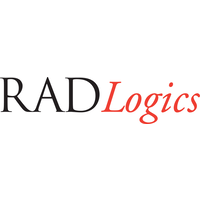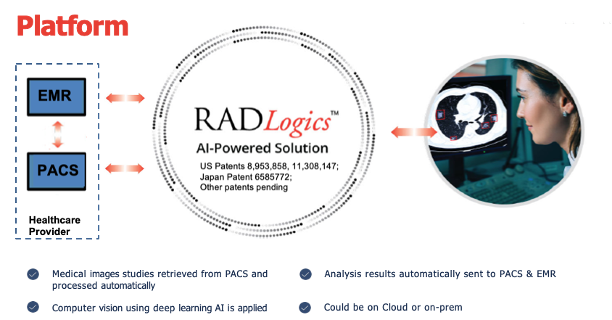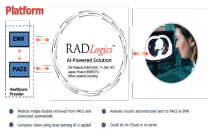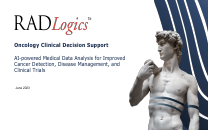
RADLogics
Founded Year
2010Stage
Acq - Fin | AliveAbout RADLogics
RADLogics is a healthcare software company that provides AI solutions for the medical imaging sector. The company offers machine-learning image analysis tools for the detection and report generation processes for imaging data such as CT and X-ray scans. RADLogics serves the healthcare industry, focusing on radiology departments that use AI technologies in their diagnostic workflows. It was founded in 2010 and is based in New York, New York.
Loading...
RADLogics's Product Videos



RADLogics's Products & Differentiators
RADLogics AIMI
Software platform and AI algorithms to automatically detect findings on medical images typically associated with cancer
Loading...
Expert Collections containing RADLogics
Expert Collections are analyst-curated lists that highlight the companies you need to know in the most important technology spaces.
RADLogics is included in 2 Expert Collections, including Digital Health.
Digital Health
11,305 items
The digital health collection includes vendors developing software, platforms, sensor & robotic hardware, health data infrastructure, and tech-enabled services in healthcare. The list excludes pureplay pharma/biopharma, sequencing instruments, gene editing, and assistive tech.
Artificial Intelligence
7,221 items
RADLogics Patents
RADLogics has filed 5 patents.
The 3 most popular patent topics include:
- health informatics
- image processing
- magnetic resonance imaging

Application Date | Grant Date | Title | Related Topics | Status |
|---|---|---|---|---|
3/7/2014 | 4/19/2022 | Medical imaging, Health informatics, Image processing, Radiology, Telehealth | Grant |
Application Date | 3/7/2014 |
|---|---|
Grant Date | 4/19/2022 |
Title | |
Related Topics | Medical imaging, Health informatics, Image processing, Radiology, Telehealth |
Status | Grant |
Latest RADLogics News
Oct 7, 2024
Selbyville, Delaware, Oct. 07, 2024 (GLOBE NEWSWIRE) -- Artificial Intelligence in Diagnostics Market size was valued at USD 1.1 billion in 2023. Projections indicate a robust development trajectory, with an expected CAGR of 22.2% from 2024 to 2032, due to the rising prevalence of chronic diseases and the growing demand for AI tools in disease diagnosis. Request for a sample of this research report @ https://www.gminsights.com/request-sample/detail/11036 As chronic diseases become more prevalent, healthcare providers increasingly turn to AI solutions. These tools enhance early detection, ensure precise diagnoses, and facilitate tailored treatment strategies for conditions like diabetes and cancer. Factors such as an aging population, sedentary lifestyles, and poor dietary habits have fueled the rise in chronic conditions. This has led to a significant increase in the target population and heightened healthcare demand. The World Health Organization (WHO) reported in 2023 that chronic diseases are responsible for 71% of global deaths, with cardiovascular diseases alone accounting for 17.9 million fatalities annually. The demand for AI tools is further propelling the progression of the artificial intelligence in diagnostics market. Healthcare facilities prioritize enhanced diagnostic precision, operational efficiency, and improved patient outcomes. This demand stems from the growing complexity of medical data, the need for faster and more reliable diagnostic processes, and an intensified focus on personalized medicine. Moreover, swift advancements in AI technologies and the widespread adoption of digital healthcare platforms are hastening the integration of AI tools across various diagnostic applications. The overall AI in diagnostic industry is segmented based on component, application, end-use, and region. In 2023, the radiology segment led the artificial intelligence in diagnostics market with a revenue share of 28.4%. Radiology, which encompasses the analysis of vast amounts of medical images like X-rays, CT scans, MRIs, and ultrasounds, has found a prime ally in AI tools. These tools excel in handling and interpreting medical images, significantly boosting diagnostic efficiency. Radiology was among the first medical domains to embrace AI, especially in image recognition and interpretation. This early adoption has resulted in mature and refined AI tools, now widely trusted across healthcare facilities. The artificial intelligence in diagnostics market from hospitals & clinics segment is projected to reach USD 3.3 billion by 2032. Given their vast and diverse patient base, hospitals and clinics require a broad spectrum of diagnostic services. AI-powered diagnostic tools play a pivotal role in managing the high volume of procedures, from imaging to lab tests, ensuring swift and accurate results. Being at the forefront of adopting advanced medical technologies, hospitals and clinics leverage their resources and infrastructure to seamlessly integrate AI systems across departments, enhancing diagnostic capabilities and elevating patient care. In 2023, North America artificial intelligence in diagnostics market accounted for USD 451.6 million, with projections indicating a CAGR of 21.2% from 2024 to 2032. The U.S. stands out as a leader in embracing state-of-the-art healthcare technologies. Healthcare providers in the region are eager to adopt AI-driven diagnostic tools, aiming to boost accuracy, minimize errors, and enhance patient outcomes. This trend is bolstered by a robust emphasis on technological innovation and a solid healthcare infrastructure. Furthermore, with a high prevalence of chronic diseases like cardiovascular issues, diabetes, and cancer, the region recognizes the pivotal role of AI-based diagnostics in early detection and management, further fueling the demand for AI solutions in healthcare. Request for Report Customization @ https://www.gminsights.com/roc/11036 Major players in artificial intelligence in diagnostics market include Aidoc, AliveCor Inc., Digital Diagnostics, Inc., Enlitic, IBM Corporation, Imagen Technologies, NVIDIA Corporation, PathAI, RADLogics, Riverain Technologies, Siemens Healthineers, Sophia Genetics, Tempus, Vuno, Inc., and Zebra Medical Vision, Inc. among others. Partial Table of Contents (ToC) of the report: Chapter 1 Methodology & Scope
RADLogics Frequently Asked Questions (FAQ)
When was RADLogics founded?
RADLogics was founded in 2010.
Where is RADLogics's headquarters?
RADLogics's headquarters is located at 11 Times Square, New York.
What is RADLogics's latest funding round?
RADLogics's latest funding round is Acq - Fin.
Who are the investors of RADLogics?
Investors of RADLogics include East Ocean Ventures and Tianjin Dazhen Asset Management.
Who are RADLogics's competitors?
Competitors of RADLogics include Coreline Soft, Aidoc, Subtle Medical, RevealDX, AIRS Medical and 7 more.
What products does RADLogics offer?
RADLogics's products include RADLogics AIMI.
Loading...
Compare RADLogics to Competitors
EnvoyAI, now part of TeraRecon, focuses on advanced visualization and artificial intelligence in the medical imaging sector. The company offers AI-powered solutions to enhance medical imaging workflows, including tools for radiology, cardiology, and neurology. These solutions aim to improve patient care by providing insights and decision support to healthcare professionals. It was founded in 2016 and is based in Durham, North Carolina.

Aidoc works as a clinical company that specializes in healthcare technology. The company offers solutions that integrate into existing healthcare infrastructure. Aidoc's products primarily serve the cardiovascular, neuro, and radiology sectors within the healthcare industry. It was founded in 2016 and is based in New York, New York.

Mirada Medical specializes in medical imaging software within the healthcare technology sector. The company offers software applications that facilitate image analysis for cancer diagnosis and treatment, incorporating AI and automation to enhance clinician productivity and patient care. Mirada Medical's products are primarily utilized in the radiation oncology, diagnostic imaging, and interventional radiology sectors. It was founded in 2000 and is based in Oxford, United Kingdom. Mirada Medical operates as a subsidiary of CTI Molecular Imaging.

Viz.ai provides artificial intelligence (AI) enabled care coordination solutions in the healthcare sector. Their services include analyzing medical imaging data with cleared algorithms to provide insights and assessments for diagnosis and treatment decisions. Viz.ai serves healthcare providers and collaborates with life sciences partners. It was founded in 2016 and is based in San Francisco, California.

Imagen focuses on providing technology-enabled diagnostic solutions in the healthcare sector. The company offers AI-enhanced medical interpretation and FDA-cleared diagnostic software designed to improve the accuracy and efficiency of medical imaging. Imagen primarily serves the healthcare industry, equipping primary care practices with advanced diagnostic tools and support. It was founded in 2015 and is based in New York, New York.

Densitas provides artificial intelligence solutions within the breast cancer screening domain. The company offers products that automate breast density assessments, track mammography quality, and help in compliance with regulatory standards such as the Mammography Quality Standards Act (MQSA). It primarily serves the healthcare sector. The company was founded in 2011 and is based in Halifax, Canada.
Loading...
